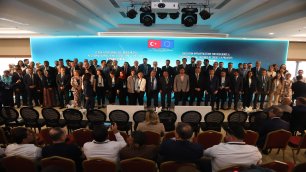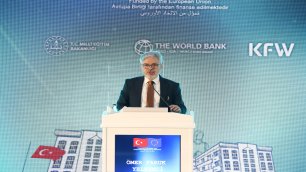"EDUCATION INFRASTRUCTURE FOR RESILIENCE" AND "EDUCATION FOR ALL IN TIMES OF CRISIS I-II" PROJECTS CLOSING CEREMONY
The closing ceremony of the 'Education Infrastructure for Resilience' and 'Education for All in Times of Crisis I-II' projects, which received funding from the EU and were implemented by the Ministry of National Education in cooperation with the World Bank and KfW Development Bank, took place in Ankara.

The ceremony, held at Mogan Vocational and Technical Anatolian High School Practice Hotel, was attended by Ömer Faruk Yelkenci, Deputy Minister of National Education; Jurgis Vilcinskas, Deputy Head of the European Union Delegation to Türkiye; René Antonio Leon Solano, Human Development Program Leader at the World Bank; Florian Sekinger, Head of Municipal Infrastructure Division for South-East Europe and Türkiye, KfW Development Bank; and other relevant stakeholders.
Deputy Minister Yelkenci, in his speech, reminded that three projects, serving as responses to migration issues in terms of educational infrastructure, have been completed. "As you know, the phenomenon of migration has many dimensions, but from an educational perspective, we can primarily talk about three main pillars that complement each other, namely education infrastructure, schooling, vocational education, and employment preparedness," he said.
Noting that it is of great importance to construct new schools to alleviate the demand-driven pressure on education services due to migration and to ensure children's access to education, Mr. Yelkenci said:
"In the last decade, we have managed to increase the schooling rate of Syrian children under temporary protection from 20 percent to over 65 percent with successful efforts in both educational infrastructure and access to education.
The 210 schools constructed through the European Union-funded 'Education Infrastructure for Resilience' and 'Education for All in Times of Crisis I-II' projects have directly contributed to meeting approximately 19 percent of this need. At the same time, construction has commenced for 100 preschool education facilities under the ongoing 'Education for All in Times of Crisis III' project.
Emphasizing that they construct hundreds of educational facilities every year with public resources, Yelkenci said: "The projects we implement with the European Union and other international financial institutions make significant contributions to the technical design of our schools and the improvement of their learning environments day by day. We see our educational buildings as places where young minds are shaped and new generations are prepared for life; we strive for our schools to be places where children, teachers, and parents come with happiness and where every corner is a learning opportunity."
Referring to the earthquake disaster that occurred on February 6th, Deputy Minister Yelkenci stated: In the aftermath of this disaster, all our educational buildings, especially the schools constructed within the scope of the project, fulfilled their duties. Our schools transformed into temporary shelter centers, aid distribution areas, soup kitchens, and earthquake coordination centers to heal the wounds of the disaster, and education resumed under the same roof after a short period of time. On this occasion, it became clear how appropriate the agenda of disaster-resilient schools is. We will continue our efforts with a 'zero-risk' understanding in terms of educational structures, utilizing both public resources and resources provided by international organizations."
Yelkenci thanked everyone who contributed to the project.
About the projects
The 'Education for All in Times of Crisis I-II' and 'Education Infrastructure for Resilience' projects are implemented by the Ministry of National Education's Directorate General for Construction and Real Estate of the Ministry of National Education with the financial support of the European Union, the World Bank, and KfW Development Bank.
The projects aim to meet the increase in demand for education services due to migration following the Syrian crisis by constructing new schools.
With the utilization of EU funds, a total of 210 schools have been constructed in 19 provinces, including Şanlıurfa, Hatay, Adana, Mersin, Kahramanmaraş, Ankara, Konya, Osmaniye, Kocaeli, Malatya, Adıyaman, İzmir, Bursa, Kilis, İstanbul, Gaziantep, Mardin, Diyarbakır, and Kayseri, and an additional capacity of approximately 160,000 students has been created.



















